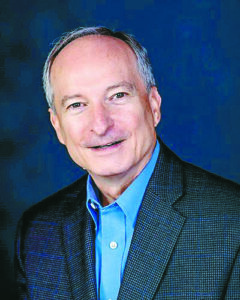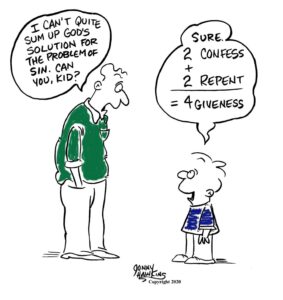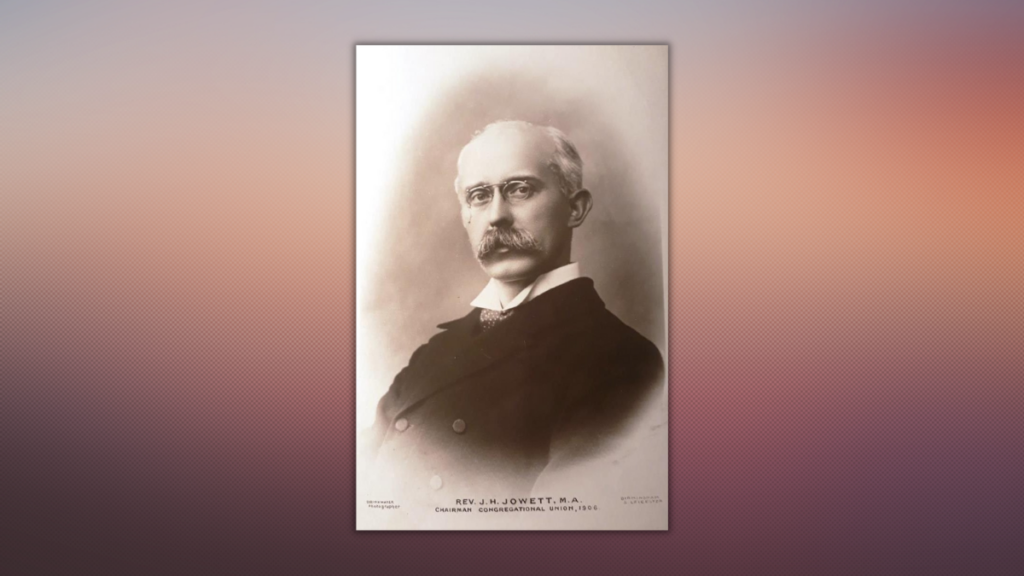By David L. Chancey
Fayetteville, Georgia
The great evangelist D.L. Moody loved to study his Bible, and he realized one day that he had never tackled the topic of grace. He took a day and did a Bible study on God’s grace. A second day was required, and then a third.

By the afternoon of the third day, Moody was so filled with the idea of God’s grace that he had to go out on the street and talk to someone about it.
Moody stopped the first person he saw, a complete stranger, and said, “My friend, do you have any understanding of grace?”
The man replied, “Sir, I’ve been married to her for over 30 years, and I still don’t understand her!”
God’s grace is a subject so big it catches us by surprise. The Scottish pastor G. Campbell Morgan once said the most beautiful word in our language is grace.
One newspaper column will not even scratch the surface of this wonderful attribute of God.
What is grace? The free, spontaneous, unmerited favor of God for sinful people. The word describes man’s poverty and God’s kindness. The Greek word is charis, which can be translated favor freely done without expecting any return.
Robert McAfee Brown wrote, “That’s what grace is — God hanging with us whether we deserve it or not, loving us no matter how unlovable we may be, and refusing to give up on us, no matter how discouraging it may become” (Brown, Reclaiming the Bible: Words for the Nineties, 1994, p. 19).
God’s grace reveals the deep, deep love of God, who wants to extend His grace to all mankind. God’s grace cannot be earned. It is given freely. “For by grace you have been saved through faith, and that not of yourselves; it is the gift of God” (Eph. 2:8).
Those who are recipients of God’s grace are called to live out God’s grace in daily life. We have to be careful not to disgrace grace. How is it possible for someone to mishandle God’s grace?
First, when we take grace for granted, we mishandle grace. Barabbas was the insurrectionist who was released instead of Jesus. Mark 15:6–15 records this Holy Week event. I’ve always wondered whatever happened to Barabbas after his release? How did this unexpected turn of events impact his life? Was he grateful?
Second, when we intentionally live in sin, we mishandle grace. Grace does not give us license for loose, sinful living, but calls us to live in a way that pleases God. Have you ever heard someone claim, “I can do anything I want to; God will forgive”? That attitude takes advantage of God’s grace. We are still accountable, and sin always has consequences.
Third, when we live in legalism, we mishandle grace. Grace calls us to move beyond legalistic thinking.

Chuck Swindoll wrote, “Legalism is an attitude, a mentality based on pride.
“It is an obsessive conformity to an artificial standard for the purpose of exalting oneself. A legalist assumes the place of authority and pushes it to unwarranted extremes” (Swindoll, The Grace Awakening, 1990, pp. 81–82).
Jesus set us free from legalism, and any overemphasis placed on rigid rule-keeping robbing us from experiencing the grace of God is mishandling grace.
Fourth, when we refuse to receive God’s forgiveness, we mishandle grace.
Because of Jesus’ sacrifice on the cross, the penalty for our sin has been paid once and for all, and forgiveness is available. Often our problems in life are deeply rooted in the fact that we have not accepted God’s forgiveness.
Commanded to forgive
Fifth, when we refuse to grant forgiveness, we mishandle grace. If God has forgiven us, and He has, then the Christ like thing to do is to forgive others when we are hurt or offended. God commands us to forgive, and we disobey when we refuse.
Sixth, when we are impatient with others, we mishandle grace. At the heart of impatience with others is often a lack of unconditional love. God loves us just as we are, but we have not yet learned to love others just as they are. When people don’t measure up to our expectations, are we critical, judgmental or petty?
Grace is a marvelous, wonderful gift, and we must be careful not to misuse it. Are we in any way disgracing God’s grace?
EDITOR’S NOTE — David L. Chancey is pastor of McDonough Road Baptist Church in Fayetteville, Georgia.
Letters to the Editor
Thank you for bringing needed, insightful information to your readers in each edition of the paper.
I often use information that you have provided in my Sunday School class, my Bible study group and my missions group.
On a lighter side but personally important, for one who does not like change, the recent article “You Gotta’ Hear This: New Year’s Reflections” by Debbie Childers has been very helpful at the beginning of this new year.
I look forward in 2024 to the continued information and education that TAB will provide.
Teresa Noell
Anniston
The need for “grace” would seem obvious enough in light of our frequent falls, failures, frustrations and even fears.
Is this need for “grace” ever fostered anywhere? Is it clearly and convincingly set forth anywhere in any frequent gatherings of people, many of whom are groping in the dark for answers which light up their lives?
In the words of J.S. Whale, “the answer is that it is met in the worship of the Church, where the Christian religion is given to us in all its living meaning.
“Apart from this, Christianity is no more than archaeology, a museum piece for antiquarians. The Church lives, not on ideas about God, but on God’s grace itself, mediated by His Spirit through the immediate rites of corporate worship. There the Word of God, contained in the words of Scripture, is proclaimed and heard as the gospel. There in the full diet of public worship in every Church throughout Christendom, ‘the means of grace’ are heard in the preaching of the Word where the promises of the gospel are visibly sealed by the ‘Yea’ and ‘Amen’ which is the publication of the gospel of redemption in all its comparable majesty and comfort” (152–153).
Morris Murray Jr.
Jasper
“Waiting on God requires the willingness to bear uncertainty, to carry within oneself the unanswered question, lifting the heart to God about it whenever it intrudes upon one’s thoughts.”
Author Elizabeth Elliot
To find meaning in life, you must remember your Creator.
Bill Wilks, pastor
NorthPark Baptist Church
Trussville
“For me, grandparenting has become my No. 1 missions field. Just seeing them come into a relationship with the Lord is the most precious thing I can imagine — just your own little grandkids,” said singer-songwriter Scott Wesley Brown.
“Even though there’s a lot of fear and anxiety felt around the world, we believe faith is the answer, and it’s encouraging to see people continue to cling to God and His Word in their greatest moments of need,” said Bobby Gruenewald, founder and CEO of YouVersion Bible apps.
For the third consecutive year, the verse people engaged with most was Isaiah 41:10: “So do not fear, for I am with you; do not be dismayed, for I am your God. I will strengthen you and help you; I will uphold you with my righteous right hand.”
“My values are freedom, family, fitness, faith and fight, and I try to focus on passions that reflect those values,” said actor Chuck Norris in an interview with The Alabama Baptist. “Not only have we raised our kids up in the ways of the Lord, our personal Christian walk with the Lord is one of the greatest reasons that our marriage is so strong and our lives are so full of happiness and joy.”
“Recently … I saw a resumé with an interesting sentence that piqued my curiosity. Under the heading ‘Skills,’ the applicant had written, ‘I am easy to work with.’ In a culture where we are often concerned exclusively about ourselves — looking to our own advantage, well-being, pleasure or profit without regard for others, this was a refreshingly selfless sentence,” said Gene Mason, Leadership Ministries.
Parables teach prayer principles
In Luke 18, Jesus taught two parables that demonstrated important principles in prayer.
First, he told about an unjust judge. A widow in his circuit asked for relief. She, no doubt, felt helpless in that society. He didn’t care, believing she was a pest. But since she was persistent, he finally granted her request.
Jesus insisted the God of the universe isn’t unjust but delights in hearing the regular prayers of His people. This is one reason a simple prayer list is helpful for us, reminding us to be persistent in our supplications.
The second parable moves from persistence to humility. Two men went to the temple to pray, but note the contrast in their attitudes. The Pharisee’s prayer announced to God how good he was!
“I fast twice a week, and I tithe all I possess,” he boasted.
Both of these are worthy practices, but Jesus instructed us to do both privately so the God who sees in secret will bless us. In other words, we don’t do good in order to be praised by others.
The Pharisee proceeded to compare himself to those around him.
“I thank God I’m not like this tax collector,” he said.
The tax collector refused any comparison when he humbled himself before the Lord.
He dared not even look toward heaven and begged God, “Be merciful to me, a sinner.”
Did God hear the prayers of both men? Of course. But Jesus declared that only one man prayed rightly.
The lowly tax collector knew the heart of God and had the assurance his prayer was answered.
Pastor Michael J. Brooks
Siluria Baptist Church
Alabaster







Share with others: